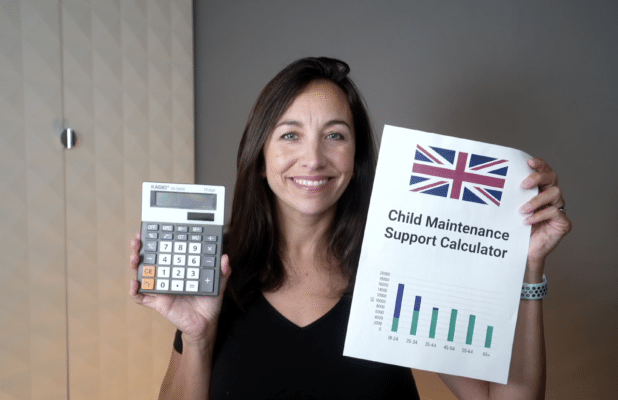Child Maintenance Support Calculator – Divorce & Separation

Are you going through a divorce and worried about your money? You’re not alone. Over 8,700 people visit our website each month looking for guidance on topics just like this.
In this article, we’ll answer your big questions:
- How is child support worked out in the UK?
- How can you use a child support calculator?
- Who has to pay child support in 50-50 custody (UK)?
- What can you do if child support is not paid?
According to MoneyHelper, the average cost of a divorce in the UK was £14,561 in 2018, and due to inflation, this cost is only increasing.1 So it’s understandable to feel concerned about finances and child maintenance during a divorce.
Don’t worry! We’re ready to guide you, giving you the best advice to keep your money safe.
Before we get started, feel free to use the resource below to find out how much you’ll need to pay in child maintenance or to calculate how much you’ll receive.
How to save money on divorce fees
How to save money on divorce fees
Divorces are hard to handle, but the financial repercussions can make a bad situation feel even worse.
The solution? Understanding your next steps and exactly how much they’ll cost.
For only £5, JustAnswer offers a trial chat with an experienced divorce solicitor. They can help you navigate the process and save you from costly face-to-face lawyer fees.
Chat below to get started with JustAnswer
Calculate your child support
Obviously, there is a lot to consider when calculating how much child support is owed. This is why I have created my own UK child support calculator:
This is a guidance tool only and not an assessment. For accurate child maintenance assessment, contact the Child Maintenance Service. Do not rely solely on this calculator’s results.
The UK Government has its own separation and divorce child support calculator, which you can use for free. You’ll be able to add your personal information to get a quick and accurate estimate of what your child support payments are likely to be.
You can use this child maintenance calculator if you’re the paying parent or if you’re not and want to see how much you are entitled to receive.
How often are payments reviewed?
CMS will automatically review your case each year.
Payments will also be reviewed if either parent applies for a variation or the paying parent has a change of circumstances affecting their income or expenses.
For example, if the child stays overnight with them more often. You should report a change as soon as it happens.
Worried About Divorce Finances?
Divorce can be complicated, especially when it comes to navigating the cost. One small error could lead to serious consequences.
But, the support of a good solicitor can help you to understand your next steps.
For a £5 trial, JustAnswer’s online divorce solicitors can help you understand your rights and guide you towards the best financial solution for you.
In partnership with Just Answer.
How is it calculated in the UK?
Child support payments can be negotiated and arranged by both parents on their own.
These arrangements are called family-based arrangements. You can use my free Child Maintenance Calculator earlier in this post to get a rough idea of how much it will cost.
The alternative option is to get the Child Maintenance Service (CMS) to calculate the required child support payments.
The CMS can even help you enforce payments if needed.
Even when you use a family-based arrangement, it’s worth using the free UK child support calculator first – and it’s always worth speaking to the CMS for support.
The CMS uses specific calculations to work out how much child support should be paid. They consider four key factors, namely:
- The paying parent’s gross weekly income
- The number of children they need to contribute for
- The number of nights they spend caring for the child(ren)
- Any existing child support payments the paying parent is already making due to a previous separation
From these four areas, 1 and 2 determine how much child support needs to be paid after the divorce. Whereas areas 3 and 4 determine how much of a discount should be applied to the amount.
We have elaborated on each of these below…
- Gross weekly income
How much the paying parent earns will be a significant factor in the amount of child support they need to pay. The CMS uses their gross weekly income to put them in one of five but potentially six categories:
| Weekly income (gross) | Category/Rate | Child support payment |
| Not provided or not known | Default | £38 (1 child), £51 (2 children or £64 (3+ children) |
| Less than £7 | Nil | £0 |
| Between £7 and £100 or receiving benefits | Flat | £7 |
| Between £100.01 and £199.99 | Reduced | Calculated using a formula |
| £200 to £3,000 | Basic | Calculated using a formula |
| More than £3,000 | Additional | Additional payments if applied to the court |
Most working parents will fall into the basic rate category, which includes a calculation using the number of children they need to support.
- Number of children
Paying parents on the basic rate (which is most working parents) will have to pay a percentage of their gross weekly income in child support maintenance payments. The percentage is higher the more children you have.
For one child, they must pay 12% of their gross weekly income. For two children, they must pay 16% of their gross weekly income. And for three or more children, the rate is 19%.
However, this rate might be reduced depending on how much time the children spend in the paying parent’s care and if they are already making child support payments after a previous divorce or separation.
- Nights spent caring for the child(ren)
The more time the children spend with the paying parent, the greater discount the paying parent will receive on their child support payments.
The possible reduction is best understood in a simple table:
| Nights spent in the paying parent’s care per year | Reduction applied to child support payments |
| 52 to 103 nights | 1/7th per child |
| 104 to 155 nights | 2/7ths per child |
| 156 to 174 nights | 3/7ths per child |
| 175 nights + | 50% + £7 reduction per child |
- Existing child support arrangements
A paying parent may already have children from a previous relationship.
If they do and they’re already making child support payments to support those children, a reduction will be applied to future child maintenance arrangements.
The reduction applied will either be 11%, 14% or 16%, depending on whether they’re already supporting one, two or three plus children, respectively.
» TAKE ACTION NOW: Get legal support from JustAnswer
Do you still pay with 50-50 care?
Yes, there is still a paying parent when the child or children spend an equal amount of time with both parents.
Divorce Costs
While child support is certainly a key component of divorce proceedings, it’s just one piece of the financial puzzle.
It’s important to keep in mind that divorce involves a range of expenses beyond supporting children. To offer a complete picture, I’ve included a table below outlining various costs associated with divorce.
| Category | Costs |
|---|---|
| Court Fees |
Filing for Divorce: £593 standard fee. Additional Applications: Financial orders or child custody arrangements. |
| Legal Representation Fees |
Fixed-Fee Options: For straightforward, uncontested divorces, with fees ranging from £500 to £1500 excluding VAT. Hourly Rate: Solicitor fees range from £150 to £400 depending on their experience and location. |
| Barrister Fees | For cases that go to court or require specialised legal advice. The cost of this will be completely dependent on your case and preferences. |
| Financial Advisor or Accountant Fees | For cases involving complex financial matters. The cost of this will be completely dependent on your case and preferences. |
| Valuation Fees | You may need to pay for property, business, or pension valuations as part of the financial settlement. The cost of this will be completely dependent on your case and preferences. |
| Out-of-Court Options |
Mediation: Some mediators charge per session (ranging from £50 to £200 per hour), while others may offer a package deal. Collaborative Law: Both parties hire solicitors, but agree to resolve issues without going to court. The cost of solicitors will vary depending on your preferences and case. Arbitration: Rates vary depending on case complexity, room hire, and arbitrator fees. |
| Indirect Costs | Time off work to attend court hearings or meetings with solicitors. Child maintenance costs. |
Who pays in 50-50 custody (UK)?
When both parents take equal care of their child(ren), the paying parent is the parent who isn’t registered to receive Child Benefit payments with HMRC.

Source: https://forums.moneysavingexpert.com/discussion/697829/child-support
However, in these cases, the paying parent pays a significantly discounted child support rate.
It’s important to remember that child support payments are for the benefit of the children and help to contribute to their education, health, and overall happiness and well-being.
Join thousands of others who got legal help for a £5 trial
Getting the support of a Solicitor can take a huge weight off your mind.
Reviews shown are for JustAnswer.
How is it enforced?
As part of your divorce or separation, you can negotiate and arrange the payment of child support independently.
However, if there is animosity or mistrust, you might want to ensure payments will be made by the paying parent. There are different ways to do this.
In England and Wales, as part of a divorce, you may choose to get a Consent Order.
This is a court order that legally binds your out-of-court agreements on the division of matrimonial assets and finances. It can also be used to legally obligate the paying parent to make child maintenance payments for one year.
There are legal and court costs to get a Consent Order, but you might qualify for financial assistance.
Another option is to get the CMS to enforce child support directly through a service called Collect and Pay.
Note this is different to the Direct Pay service they also offer.
With Collect and Pay, the CMS will take the money from the paying parent and send it to the other parent. The downside is that this service comes with high fees on both sides (x5 more for the paying parent).
You could also consider mediation to help you resolve child maintenance disputes amicably without going to court, potentially saving you money and time.
What if my ex doesn’t pay what they owe?
If they don’t pay the child maintenance they owe you, then if they’re an employee, the CMS can try to take money from their wages; if not, they can try to take money from their bank or building society account.
If they’re not able to do this, CMS can take them to court after applying for a court order to take legal action and try to get the money using bailiffs or making them sell their home.
They could even take away their driving licence or passport or send them to prison! So, the way I see it, it’s not worth the risk of not paying!
Divorce Doesn’t Mean Financial Ruin
Legal advice can make all the difference when navigating the financial aspects of divorce, and affordable help is within reach.
Normally, the cheapest solicitors in the UK will put you back at least £130 per hour.
But, for a £5 trial, a divorce solicitor from JustAnswer can review your situation and provide personalised guidance. It’s a no-brainer!
Try it below.
In partnership with Just Answer.



